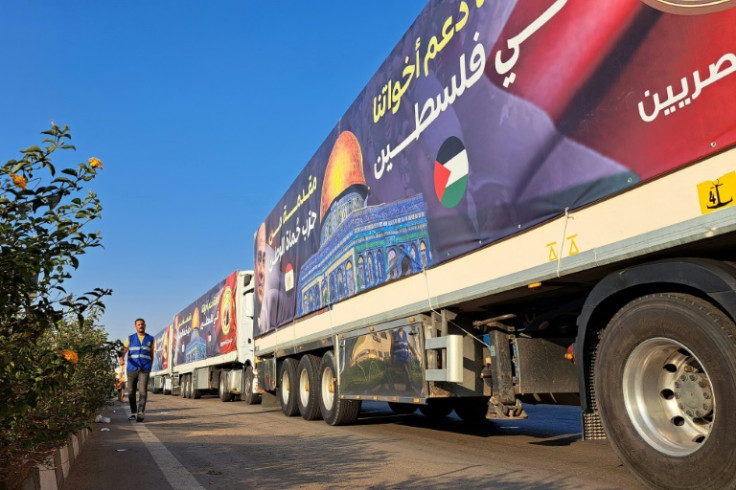
The first aid trucks arrived in the war-torn Gaza Strip from Egypt on Saturday, bringing humanitarian relief to the Hamas-controlled Palestinian enclave suffering what the UN chief labelled a "godawful nightmare".
Israel has vowed to destroy Hamas after the Islamist militant group carried out the deadliest attack in the country's history on October 7.
Hamas militants killed at least 1,400 people, mostly civilians who were shot, mutilated or burnt to death on the first day of the raid, and took more than 200 hostages, according to Israeli officials.
Israel says around 1,500 Hamas fighters were killed in clashes before its army regained control of the area under attack.
AFP journalists on Saturday saw 20 trucks from the Egyptian Red Crescent, which is responsible for delivering aid from various UN agencies, pass through the Rafah border crossing from Egypt into Gaza.
The crossing -- the only one into Gaza not controlled by Israel -- closed again after the trucks passed.
The lorries had been waiting for days on the Egyptian side after Israel agreed to allow aid to enter following a request from its top ally the United States.
UN humanitarian chief Martin Griffiths said the convoy "must not be the last" and that the delivery would start "a sustainable effort to provide essential supplies" to Gaza.
UN chief Antonio Guterres warned Friday that the aid was "the difference between life and death" for many Gazans, more than one million of whom have been displaced.
"Much more" aid needs to be sent, he told a peace summit in Egypt on Saturday.
Israel's military campaign against Hamas has levelled entire city blocks in Gaza, killing more than 4,300 Palestinians, mostly civilians, according to the Hamas-run health ministry.
Israeli troops are massed on the Gaza border ahead of an expected ground invasion that officials have pledged will begin "soon".
As international tensions soar, Egyptian President Abdel Fattah al-Sisi was hosting a peace summit in Cairo on Saturday attended by regional and some Western leaders.
"The time has come for action to end this godawful nightmare," Guterres told the summit, calling for a "humanitarian ceasefire".
The region "is reeling in pain and one step from the precipice", he added.
Egypt, historically a key mediator between Hamas and Israel, has urged "restraint" and called to restart long-frozen peace talks.
But diplomatic efforts to end the violence have made little headway, with Israel and its enemy Iran, a supporter of Hamas and other armed groups, among those absent from the Cairo talks.
A full-blown Israeli land offensive carries many risks, including to the more than 200 hostages Hamas took during their raid and whose fate is shrouded in uncertainty.
So the release of the first two hostages -- US mother and daughter Judith and Natalie Raanan -- offered a rare "sliver of hope", said Mirjana Spoljaric, president of the International Committee of the Red Cross.
US President Joe Biden said he was "overjoyed" and thanked Qatar, which hosts Hamas' political bureau, for its mediation in securing the release.
He said he was working "around the clock" to win the return of other Americans being held.
Natalie Raanan's half-brother Ben told the BBC he felt an "overwhelming sense of joy" at the release after "the most horrible of ordeals".
Traumatised families with loved ones missing in Gaza demanded more action.
"Absolutely nothing has been done," Assaf Shem Tov, whose nephew was abducted from a music festival where hundreds were killed by Hamas, said Friday.




